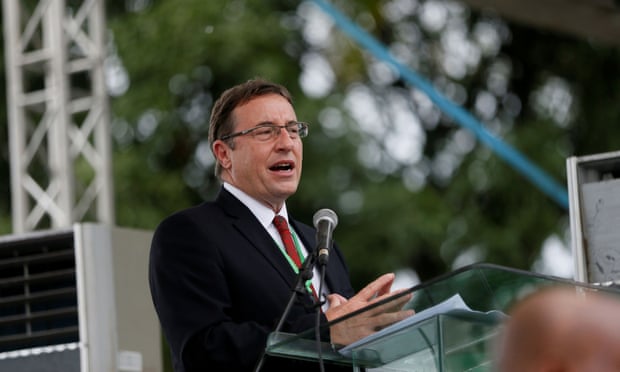Developing countries, many of which are deeply indebted following the Covid-19 crisis, must be the focus of the Cop26 summit if the UK hopes to make it a success, the UN’s development chief has said.
Achim Steiner, the executive director of the UN development programme, said: “For developing countries at this juncture, a sense of recognising their dilemmas is extremely important. They do not need to be told that climate change is important, that everybody has to do more.
“They are under severe stress in the midst of this pandemic, of economic regression, of growing poverty rates. It is critical that the UK is able to echo the genuine and legitimate concerns that developing countries articulate.”
Any failure by the UK hosts to recognise these concerns could lead to breakdown, he warned. “Cops have succeeded when no group of countries had a reason to feel they were overlooked, ignored or dismissed. Inclusiveness is critical. There are countries that feel they were promised financial support and it has hardly materialised. Knowing those sensitivities is part of being well prepared,” he said in an interview with the Guardian.
Cop26 will open on Sunday in Glasgow, with more than 25,000 delegates, including more than 120 heads of state, expected to take part.
Steiner said poor countries’ concerns over access to finance and other assistance were at the heart of the talks. “Accelerating a climate implementation plan requires additional investment, and that money is simply not easily found,” he said. “Recovery [from the Covid-19 crisis] can actually happen faster, [if you] create jobs with green transitions, but you still need capital to invest, whether private, public or concessional.”
At least 60 of the poorest countries are facing debt distress, which could cause them to default or enter a debt crisis, with disastrous impacts on their economies and the wellbeing of their people.
In 2009 poor countries were promised $100bn (£730bn) a year by 2020, but that has not been met, though recent research shows it can be met by 2023. “In the midst of a trillion dollar emergency pandemic response mode, it kind of is difficult to stomach for many developing countries that a promise made in 2009, repeated in 2015, is still not fulfilled,” said Steiner.
Steiner, previously the head of the UN environment programme and a Cop veteran, said the measure of success at Glasgow would be whether countries could work together. “There has to be some palpable sense of shared purpose and unity. Is there a sense of common purpose, or are divisions going to define all the signals and symbolisms of Glasgow?”
He said the summit could not be “a complete failure”, as many countries have already come forward with plans to cut greenhouse gas emissions substantially, but could still disappoint, if further plans were inadequate and if developing countries were not given the assurances they need.
“The world is actually in a better place on accelerating climate action than it was before the pandemic, just taking the sheer amount of investment that is being directed towards renewable energy and green transitions, and the announcements being made by the EU, the US, Japan, China,” he said.
But there was still a danger that the positive moves were coming too late to stave off dangerous levels of heating, he added. “This is the problem, that we’re running out of time. Five years ago, some of these announcements would have been revolutionary. Now, with our backs against the wall and the clock running, nothing is quite adequate any more.”
The UK as host would hold the key to success or failure, Steiner added, as the host could foster a positive atmosphere of unity and constructive dialogue, or lose control of the complex process, involving 197 countries.
“The UK could become a fantastic host, create an atmosphere [of unity and constructive discussion], or the UK could step on a banana skin and before you know it you have a midnight session in a Cop where some procedural issue has become a major crisis. These are the kind of known unknowns that are always part of a Cop scenario.”
More about:















































